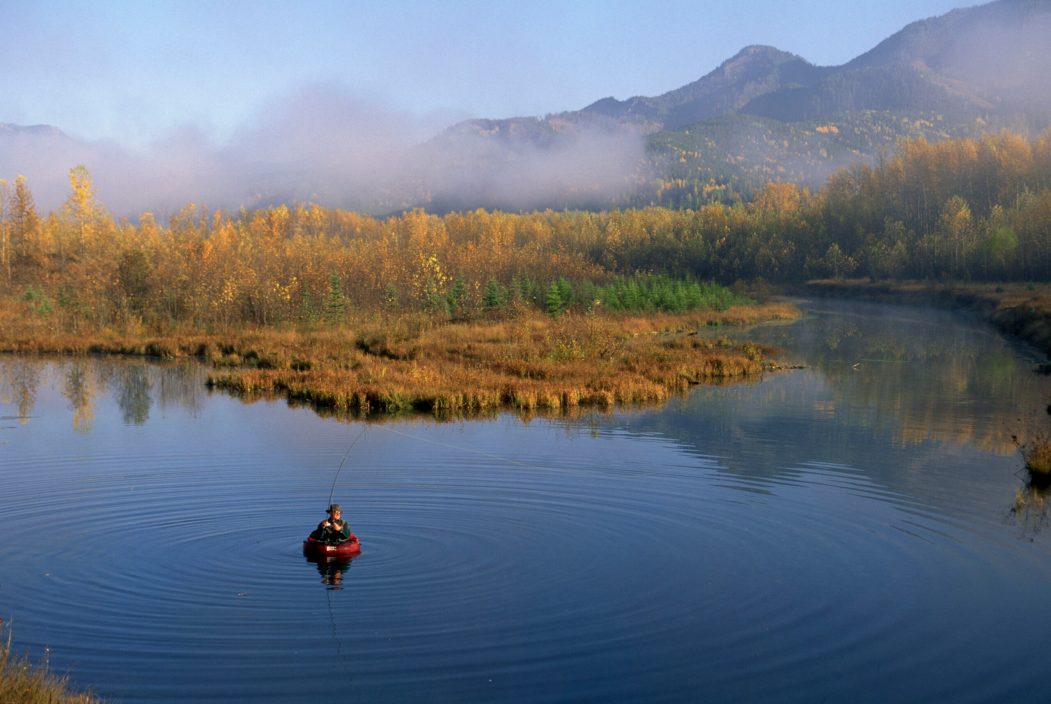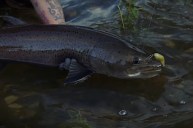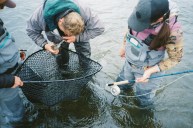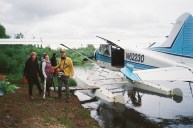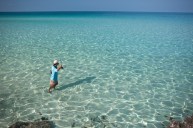Planning a backcountry fishing trip to get away from it all can be an incredibly exciting venture. It can also be a little daunting to pull off, as backcountry fishing trips require a little more care and preparation than a day at your local fishing hole or on a paid fishing charter.
Whether you are planning a half-day trip down a local trail or an epic, week-long fly-fishing trip in the western United States, you want to make sure you're prepared to handle anything before you even set foot in the wilderness or take your boat down a remote river.
Not only is there the weather and difficult access to contend with, but backcountry fishing sites are also often far from any major roads or cell service. If you forget or break something, it isn't practical to run to your local bait and tackle store to grab an extra or look up a Youtube video for a DIY repair.
So, when planning your next backcountry fishing trip, make sure to grab your fishing license, along with the following gear and intangibles.
1. Extra Tackle and Tools
Let's say you're on a week-long trip in Yellowstone National Park and the fish are really keying in on one particular fly pattern but you've just broken off your only one. Or maybe you're tarpon fishing in a remote part of Florida's Everglades National Park, where the flats fishing is good. Between the aggressive nature of the fish and the shallow water snags of the area, you're breaking off left and right. In either situation, without ample backups, you could find yourself running low on supplies quickly.
Then what do you do? Cut things short and head back to the nearest civilization for more tackle? That kind of defeats the purpose of getting away from it all.
If you're planning a trip into the backcountry, make sure that you are adequately prepared with enough fishing gear to meet a multitude of contingencies. Take into consideration the type of fishing you're doing ahead of time and make smart decisions on what to bring.
Don't go overboard with extras though, especially if you're packing all your gear in. If weight is a factor, try to eliminate anything you don't think you'll use. Hone in on what species of fish you're going after and what works best for them, and be ready to MacGyver your way through some repairs if need be.
2. Proper Clothing
It doesn't matter if you're just going out for a day of trout fishing a few miles down a National Forest trail or a full week of fishing for wolf fish in the Amazon, being properly dressed for the trip is a big deal. You want to be able to protect yourself from whatever nature throws at you.
Bring different layer options for a variety of weather conditions, and always be prepared for rain, wind, or drops in temperature. Yes, even in the summer. Being near icy water, whether it's an alpine lake or a flowing river, is a sure way to get cold quickly.
The old adage "cotton kills" holds true, so make sure you're bringing clothing that is moisture-wicking. Wool is a great option for base layers, and so is synthetic down for insulation layers, since both materials retain their insulating capabilities when wet.
We also recommend more than one set of footwear if you have the space to bring them. If one pair of boots or shoes gets soaked, you can change them out while the other dries. Close-toed Crocs can be a good backup option, as they are incredibly light, dry quickly, and can be clipped to the outside of your pack with a carabiner. If you're truly tight on space or weight, just an extra pair of socks can go a long way.
3. Food for a Shore Lunch
One of the best parts of a backcountry fishing trip is catching and eating your dinner. Make sure you bring a sharp filet knife, a small spice kit to add flavor, and some lightweight cooking equipment. The easiest and least-gear intensive way to cook your fish is over a campfire, but make sure to check if there are any fire bans in the area before heading out, and always properly extinguish your campfire.
Don't get cocky though, and place all your bets on catching a fish. You want to be prepared just in case the fish aren't biting. Being undernourished on a backcountry trip can quickly go from frustrating and uncomfortable to incredibly dangerous if you have to cover long miles and don't have the energy to do so. Any fish you catch should be treated as an added bonus-snack, so make sure to bring plenty of other food with you. If you're on a multi-day trip, bring at least a day's worth of emergency rations, to account for any accidents that may happen.
4. A Keen Knowledge of Your Gear
Remember that earlier point about bringing enough gear? It's not enough to simply have all the gear, you also want to have a working knowledge of your equipment, too.
Before you take a new piece of gear into the backcountry, give it a test run and make sure that you are familiar with it. If you're spin fishing for trout with light tackle, teach yourself how to fix or re-spool your reel ahead of time. Bringing a repair kit is a good idea too, so you can fix small problems in the field.
If you're planning on camping on your trip, set up your tent in the backyard beforehand to make sure you have all of the pieces, and that everything is in good working order. The same goes with your sleeping bag; sleeping bags are rated to certain temperatures, so make sure you're bringing the proper bag for the weather. Give your layering system a test run too, by wearing the clothes you're bringing on your trip out in similar conditions. Lastly, make sure to break in any new footwear so you don't get blisters.
5. A Sense of Direction (And Navigational Tools to Back it Up!)
Even if you know the area you'll be fishing like the back of your hand, you'll want to bring some form of navigation, be it paper maps and a compass, a GPS, or an app on your phone. Many a wilderness survival story starts with someone who thought nothing bad could happen to them because they knew the area well. It happens to the best outdoors people, and even the most experienced fisherman can stray from the beaten path, especially if they're chasing bigger and bigger fish downstream.
The first step to not getting lost is prevention. Always be aware of the direction of your camp, and keep an eye out for obvious landmarks, like mountains or lakes, that can help you orient yourself if you get turned around. Make sure to also bring backup navigation tools, and know how to use them. The most basic is a map and compass. While light and inexpensive, they can be difficult to use if you don't have the training, so brush up on your skills, or take a course, before heading into the backcountry.
A more advanced option is a GPS unit, like the Garmin GPSMAP 67i. Most GPS units allow you to plan, follow, and record your adventure, and share your location with friends and family back home. Just make sure it has fresh batteries, and bring extras. Lastly, a more lightweight option than a GPS is your phone. Apps like Gaia and OnX allow you to download topographic maps of areas before trips, and then track your location offline. Again, just make sure your phone has enough battery life, and that you've downloaded the correct maps before leaving home. If using a GPS or your phone, it's always a good idea to have a backup map and compass, just incase your drop the device in water or run out of battery.
If you're planning on spending a lot of time out of service, consider getting a satellite communication device, like a Garmin inReach. These devices have two-way texting and SOS capabilities, and add a cushion of safety to any remote trip.
6. Observation Skills
Sometimes the fish just aren't biting what you're throwing. This is where the powers of observation are key, If you see fish hitting the surface, what are they feeding on? You need to figure that out and then match your lures or flies appropriately.
The best anglers use the visual clues the water and surrounding environment are giving them to perfect their fly fishing setup and technique. Fish give clues as to how they are behaving, you just need to know where and how to look. You've probably heard the phrase "match the hatch." Well, this applies to all aspects of fishing, not just what flies to use. Use your observation skills not only to determine what the fish are feeding on but also what water they're favoring, calm eddies or flowing streams. Are the fish surfacing to eat, or are the munching on things lower in the water column? Match your flies and fishing technique to whatever the fish are already doing, and you're much more likely to get lucky.
You can also apply these powers of observation for saltwater fishing trips, remote inshore locations like mangrove swamps, and flats fishing.
And don't forget polarized sunglasses. A good pair of sunglasses will make it a lot easier to peer into the water and see what the fish are up to.
7. A Positive Attitude
No matter how well you prepare for a backcountry fishing trip, sometimes things just don't work out. Maybe a cold front blows in or your rod breaks beyond repair, or your sleeping bag gets wet. Maybe you mistimed a spawning run or mayfly hatch, or the fish have developed lockjaw. When the unexpected happens, you need to know how to roll with the punches. As long as you can stay safe and relatively comfortable, even the most unlucky fishing trip can still turn out okay. Fix what you can, and keep a good attitude. Remember, a day on the water, even with a broken rod or a rain storm, is still better than a day at the office.
READ MORE: How to Remember—and Hide—Your Best Fishing Spots
